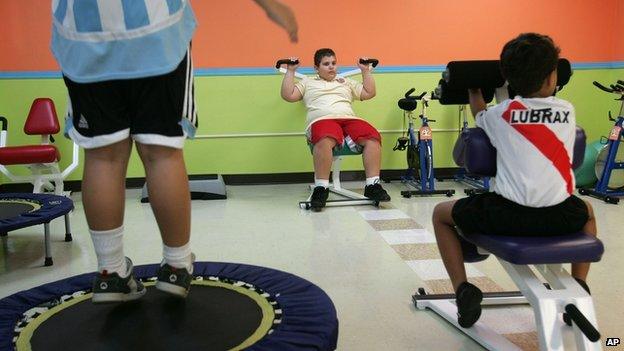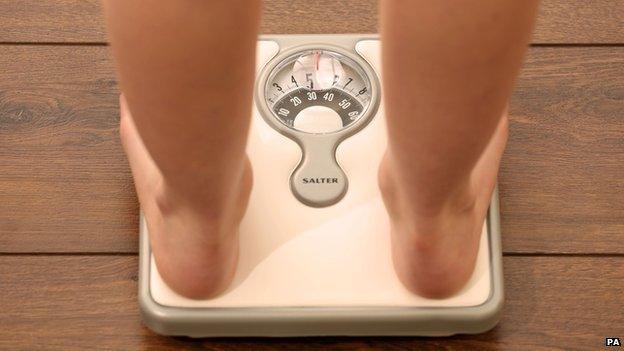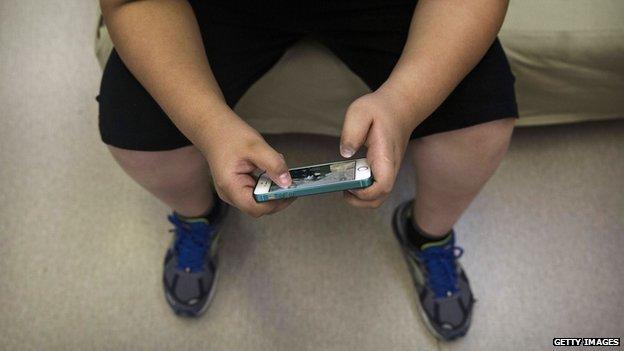Could fining parents cut childhood obesity?
- Published
- comments

Obesity is described as one of the biggest problems facing mankind. The small US territory of Puerto Rico is debating whether to fine parents who fail to get their children to lose weight. But would this work elsewhere?
More than 600 million people, external, or 13% of the world's adult population, are obese. The rate more than doubled between 1980 and 2014, according to the World Health Organization. The estimated cost to the global economy is $2tn (£1.3tn), external, including £47bn to the UK, external.
National and local governments have struggled to address obesity, defined as having a body mass index - based on the ratio of height to weight - of more than 30, external. They often face accusations of nanny-statism and opposition from food and drink companies if they do so. Attempts have been patchy and experts are divided on what, if anything, works.
In 2011, Denmark brought in a "fat tax" on foods containing more than 2.3% saturated fat, but the inflated prices drove consumers over the border to Germany. The policy was dropped a year later and the government cancelled plans for a tax on sugar.
In 2012, France quadrupled the tax on saturated fat-rich palm oil, dubbed the "Nutella tax", external because the popular hazelnut spread contained the ingredient.
Voters in Berkeley, California, backed calls for a one-cent-an-ounce tax, external on fizzy drinks, in a referendum last year. The beverages were banned from schools in New South Wales, Australia, in 2007, but this has sometimes been ignored, external.

Meanwhile, families in England, external and several US states, external are sent warning letters warning if tests in schools show children are overweight.
So far, anti-obesity policy has focused largely on taxation or providing information. But, on Friday, politicians in Puerto Rico, external, a self-governing US territory, start debating whether the government should get more involved in one of the main perceived reasons for the growth in childhood obesity - irresponsible parenting.
If the legislative assembly approves Senator Gilberto Rodriguez Valle's plans, teachers will be told to look out for students they think are obese., external They would refer those detected to a counsellor or, in severe examples, to a social worker. Health department officials would meet parents and decide whether the obesity comes from overeating or a medical condition.
If food is the problem, it would be up to parents to set a diet and exercise programme, with monthly visits by officials to make sure it's being kept up. After six months, they would examine the child again. Parents would face fines of up to $800 (£525) if there was no improvement within a year.
Opponents say that, in a society where thinness has become a status symbol perpetuated by glossy magazines and media images, the idea of teachers acting as body police will further stigmatise the overweight. There is also a large question mark over whether this approach, very much "stick" rather than "carrot", can work.
But Rodriguez Valle and his supporters insist families will be informed in confidence, meaning no humiliation for children in front of classmates. Fines are "necessary for society", argues a colleague, external, saying: "The obese child is a health problem that can become a financial burden because the child can develop diabetes, heart ailments and other diseases."
In 2013, 27.9% of adults, external in Puerto Rico were described as obese, upper to middling by rates across the US. However, the figure for children under the age of four - 17.9%, external - is the highest of all US states and territories. If parents are failing to do their job from the start, schools have to ensure standards instead, backed by financial penalties, it is argued.

Denmark's fat tax

In October 2011 Denmark introduced a fat tax in an attempt to curb obesity
Foods containing more than 2.3% saturated fat - including dairy produce, meat and processed foods - were subject to the charge
It added 16 kroner ($2.40; £1.50) per kg (2.2lb) of saturated fats in a product, increasing the price of a 250g pack of butter by 2.20 kroner.
It was scrapped just over a year later, with authorities saying the tax had inflated food prices
At the same time the Danish tax ministry cancelled long standing plans to introduce a tax on sugar

There is a sense of helplessness in the face of the world's weight gain, largely attributed to rising food intake and falling activity levels. "Not only is obesity increasing," a study funded by the Bill and Melinda Gates Foundation, external, published last year, said, "but no national success stories have been reported in the past 33 years. Urgent global action and leadership is needed to help countries to more effectively intervene."
The latest UK figures show 24.7% of adults are obese, external, lower than Puerto Rico, but still the among the highest in western Europe, external. The rate was 14% for children aged two to 15 in England, 17% in Scotland and 19% in Wales, external in 2012. In Northern Ireland in 2011-12, it was 10%, external. So, does Puerto Rico's proposal appeal?
"Obesity isn't like smoking, the cutting of which has been a public health success in recent years," says Andrew Hill, professor of medical psychology at Leeds University. "Smoking is a single behaviour that's really explicitly linked to a number of adverse health conditions, whereas obesity is a state of body,
"The causes are driven by environment. You live in an environment which encourages you to eat lots of food and discourages physical activity. To then apply a penalty to punish something that people have varying degrees of control over seems to be not just counterproductive but morally dubious."
Obesity is more of a problem among poorer groups, who live in an "obesogenic" environment, according to Hill. He argues that exercise is less available and, given the higher proportion of household income spent on food, leads to the purchase of cheap, highly calorific products, sugary or fatty, with limited nutritional value.

Hill dislikes the Puerto Rican proposal. "We need to move the argument away from saying it's all about individual responsibility and 'it's you to blame'. People do have some responsibility but we must recognise the power of environment and how difficult it is to change for the rest of your life."
Philadelphia, external - the most overweight of America's major cities - has cut the obesity rate among children, external. The city authority has persuaded shops to stock more fruit and vegetables in areas once described as "food deserts" because of a lack of nutritious offerings. It has also banned full-fat milk from school canteens, as well as deep-fat frying, while sugary drinks have disappeared from vending machines.
"None of these efforts involved stigmatising or penalising parents," says Rebecca Puhl, deputy director of the Connecticut-based Rudd Center for Food Policy and Obesity, external. "In contrast, these changes exemplify ways to support and empower parents to make it easier to improve the health of their children."
Puhl argues that a more integrated approach. involving schools encouraging better eating and more exercise, is needed.
But the Puerto Rico obesity plan has echoes of the action taken in the UK and elsewhere to combat persistent truancy from school. In March last year, it was revealed that a record number of truancy fines had been handed to parents but that persistent truancy was falling. But there has been criticism that there is no link, external and that fines do not work. Some critics believe fines disproportionately affect poor parents.
For a study published in 2000, the economists Uri Gneezy and Aldo Rustichini, external tested the effects of fines on parents who consistently picked up children late from daycare centres in Israel. Rather than deter the behaviour, lateness increased because they started to regard the fine as a reasonable fee for extra childcare, rather than a punishment. "A powerful, intrinsic motive was crowded out by a weaker, extrinsic one," they concluded.
"That's unlikely to happen with obesity because there's a stigma surrounding it," says Peter Ayton, professor of psychology at City University. "But there's definitely room for thinking more about incentives, maybe some sort of rewards for losing weight, especially as obesity tends to affect the poor most.
"People respond to incentives and deterrents. There needs to be more discussion of what works."
More from the Magazine


Subscribe to the BBC News Magazine's email newsletter to get articles sent to your inbox.